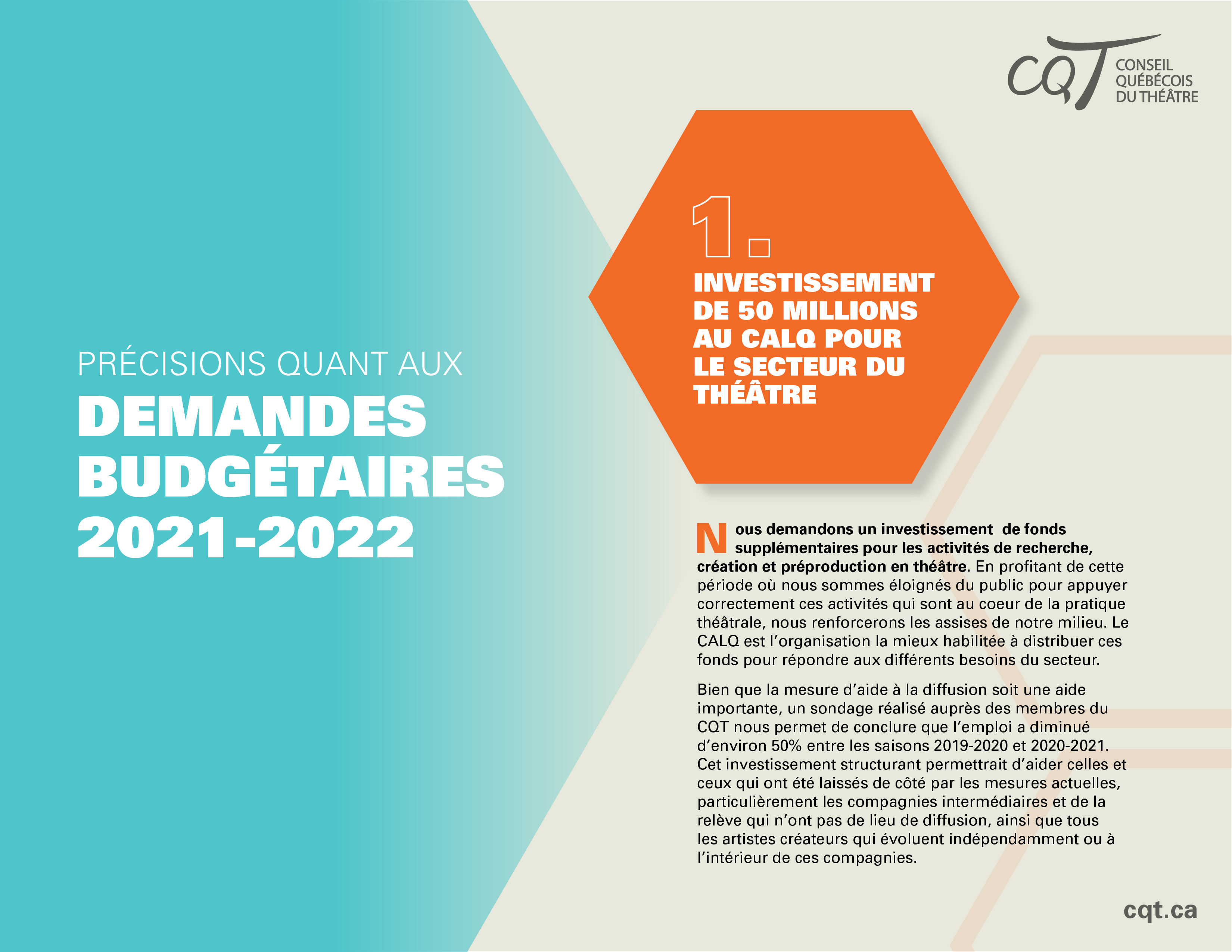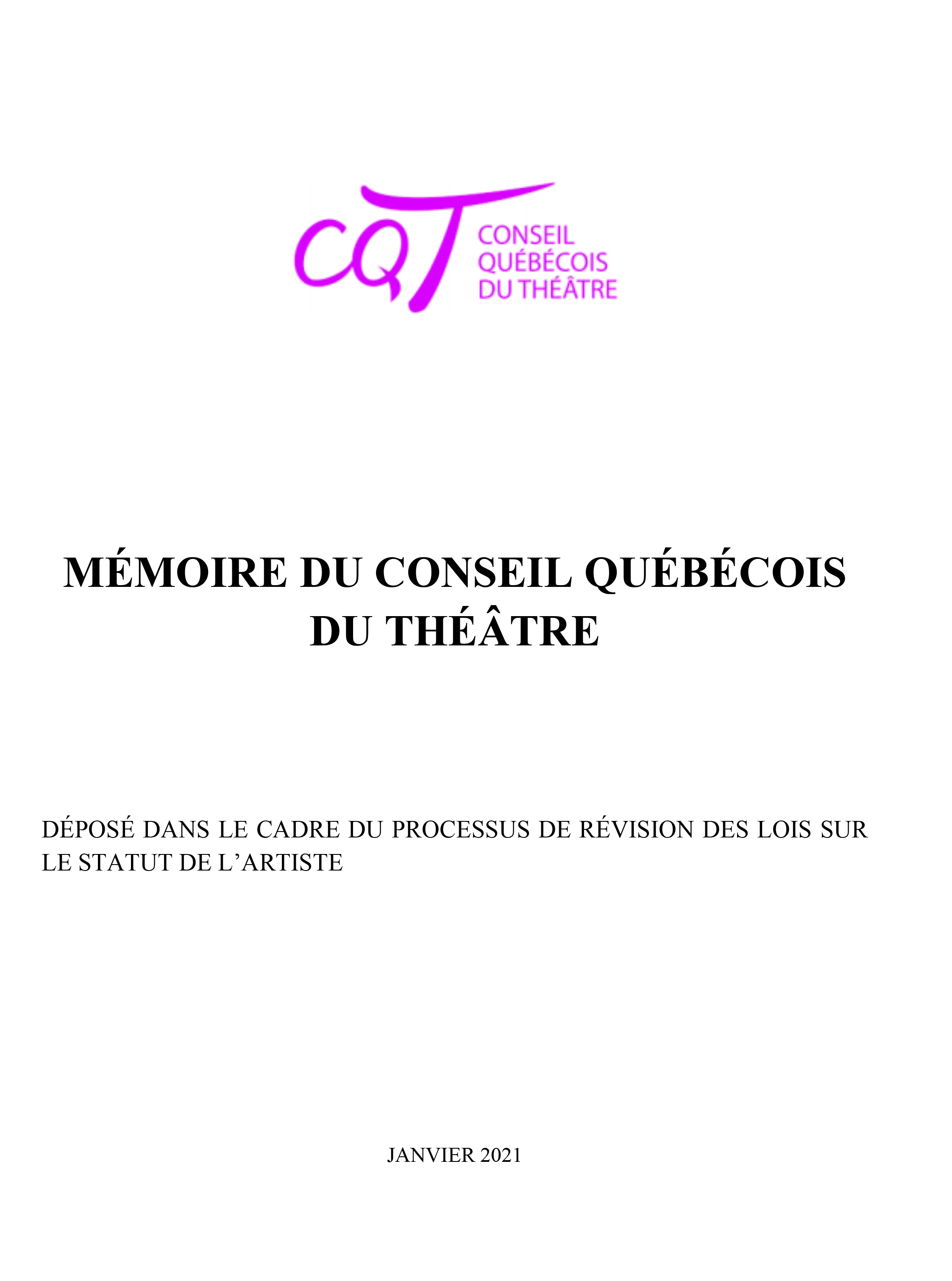Strategic CQT
To all members of the CQT,Today, we are launching Strategic CQT, a newsletter directed specifically to our members, the objective being to better inform you about the strategic and political actions CQT is taking. We know you have many questions and that you would also like to understand more clearly what procedures we are undertaking in the context of the crisis we are currently experiencing. This newsletter is one of the tools we are introducing in order to enhance communications with you all.
You will be able to consult our schedule so that you can find out who we are speaking to as well as a series of detailed documents. For example, this week we are sending you documents that outline CQT's budgetary requests to the Quebec government as well as CQT's brief regarding the revision of the Status of the Artist Acts. We are also introducing you to the Strategic Planning Committee, one of our committees which is working diligently on the core issues of the management of the health crisis.
Over the next few weeks, we will try to answer questions you may have about our activities and our strategic decisions. Do not hesitate to contact us or your associations who are members of the CQT and who are active in our committees.
Happy Reading!
Catherine Voyer-Léger, Executive Director of the CQT
Do you know about the CQT's Strategic Planning Committee?
CQT's Strategic Planning Committee was formed in June 2020 in order to help the CQT deal better with the health crisis. For several months, the committee met weekly to discuss concerns in order to prepare and defend various political strategies. Now, since the beginning of 2021, the committee meets every two weeks.The mandate of this committee is to reflect and act quickly on political issues related to the pandemic and recovery for the sector, as well as the socio-economic conditions of artists and cultural workers, and this at the municipal, provincial and federal levels.
Strategic CQT # 9
Update on reopening measures - covid-19| > Level 2 - Pre-alert (yellow zone) On June 8, during a press conference, Premier François Legault announced that as of Monday, June 14, 2021, all regions in the orange zone will become yellow, representing nearly 85% of the province. What this means for our community amongst other things, is that masks will still be required for audiences, but they can be removed once the person is seated. Also, theatres must ensure that there is a distance of 1.5 metres between the seats of people who do not live at the same address. |
 |
Prior to this same press conference, we had the opportunity to attend a group meeting organized by the Ministère de la Culture et des Communications to inform the performing arts community about the latest modifications in prevention measures for workplaces in the context of deconfinment. / ajustements des mesures de prévention dans les milieux de travail en contexte de déconfinement.
We were also provided with the Guide de normes sanitaires pour le secteur des arts de la scène, les salles de spectacle et les cinémas - COVID-19. This document includes new changes effective June 7, 2021. Most specifically, it specifies the distances to be respected on stage between artists following full vaccination:
Survey - reflections on the pandemic
At CQT, the summer season will be a time for reflection and we would like to use this transitional period to hear from you about the past year, the lessons to be learned from this busy period and your concerns and wishes for the future.
Your ideas, recommendations and experiences are invaluable to us and will guide us in our activities and strategies. The purpose of this survey is not a scientific one; we simply want to know more about our environment and the individuals who make it so exceptional.
Therefore, we encourage you to answer the questions that concern you in particular or all of them if you wish. Please feel free to respond; every thought will be read and seriously considered.
Political Consultation Round table
In addition, as of September 2021, the CQT will form a Political Round Table. This table will be particularly active during the election period and will serve to fuel the discussions concerning our needs and political stances. These will also be transmitted to the various governing bodies and will help structure our strategic choices.
People from all the different sectors of our community are most welcome to participate at this table. If you are interested in policy and development issues, please write to us at recherche@cqt.qc.ca to let us know of your interest.
Acknowledgements - Strategic Committee
The Strategic Committee was created in June 2020 due to the urgent needs to voice a political strategy in representing the different issues of our community and to propose structuring measures to the different levels of government to support theatrical practice during the pandemic. A year later, if the CQT has become a key player in the many meetings and negotiations between political authorities and the cultural milieu, it is due, in particular, to the exceptional commitment of the members of the Strategic Committee. However, now having reached the end of its useful life, we terminated work of this committee's on June 2, 2021.
Thank you for your kindness and support. You have greatly contributed to my learning about the different issues of our practice and to develop my strategic and political senses. Our exchanges will remain a highlight of this past year, especially because I had the immense good fortune to get to know each and every one of you. Thank you from the bottom of my heart.

Anne
President
Conseil québécois du théâtre
Agenda
June 8: Group meeting with the CNESST to discuss the Guide de normes sanitaires pour le secteur des arts de la scène, les salles de spectacle et les cinémas - COVID-19
> Upcoming events
Meeting with the office of the Minister of Culture and Communications, Nathalie Roy, to discuss the fall season. The sanitary requirements for the fall season should be made public around mid-July.
Deconfinement Plan
During a press conference on May 18, 2021, Premier François Legault presented his long-awaited deconfinement plan. It is a gradual one that shows us the various stages of this
deconfinement over several weeks, including for cultural activities.
In the short term, the authorization to have outdoor shows and the lifting of the curfew has
offered some relief. However, we were still waiting for details on how these measures will be
applied. The announcement of the increase in the number of spectators to a maximum of 2500
does not really concern the theatre community.
In that same announcement, the Premier also intimated that we could expect the majority of the
Province of Québec to move into the yellow zone by mid-June, and finally reach the green zone
by the end of the same month. This not only bodes well for the arts and culture community, but
also for every individual who is looking forward to being reunited with their loved ones.
New Ministerial Order
In the end, the tourism and culture sectors had to wait until the next day to learn all the
particulars of this announcement and how it affected these areas. The specifics are found in
this newsletter, which was previously shared by the CQT.
During the second press conference, it was confirmed that the same rules would be applied for
both indoor and outdoor shows. We have waited for this news for several weeks, as outdoor
performances tend to be less risky, and organizers could easily comply with the same rules for
indoor performances.
However, this particular element took a long time to be explained and we are concerned that
organizations had to wait until the last minute to get confirmation of details, causing a lot of
hassle and avoidable stress.
When asked about the risks of attending theatres and cultural events and their possible source
of contagion, Dr. Éric Litvak of the Public Health Department responded: "In fact, it is thought
that this is an activity that does not really carry a very great risk. Risks are often associated with
socializing before and after - Ex. if you have a drink, etc. [...] We have not had any outbreaks in
entertainment venues in Quebec. " He also said he was cognisant of the fact that in our sector,
a change from 2 meters to 1.5 meters makes a significant difference in the short term in relation
to audience attendance.
Looking to the fall
Encouraged by the success of the vaccination rollout, we are now told that the new target for a
return to somewhat near normal would be towards the end of August. Therefore, our next
objectives for discussions with government officials will be mainly focused on sanitary measures
that would be required for the fall.
At the same time, we will deliberate with the CNESST concerning requirements of restricted
working conditions for performers that involve obligatory distancing on stage and the impact
these restrictions have on our work and on the extent of our presentations. We hope to see
these limitations reduced or, at best, repealed.
At the suggestion of some of our members, we will also emphasize the difficulties faced by
organizations regarding the distancing of 2, 1.5 or possibly 1 meters between spectators who do
not come from the same bubble. We will also note that, depending on the type of configuration
of the room, these measurements can considerably reduce the number of spectators.
Therefore, we will support the idea of introducing a rule of 1 seat out of 2 if this particular
restriction is still required.
Agenda
May 12: Meeting with Simon Brault, Director and CEO of the Canada Council for the Arts.
May 18: Meeting with Louis-François Tétreault and Jean Massicotte, members of Dr. Mylène
Drouin's team, Director of Public Health for the Montreal region.
May 19: Meeting with the MCC cabinet to learn about the details of the new health measures for
the performing arts community.
Committee Membership
Quincy Armorer, Artistic Director of the Black Theatre WorkshopIsabelle Boisclair, Executive Director of the Maison Théâtre and representative of the Association des diffuseurs spécialisés en théâtre in the CQT's board of directors
Danièle Drolet, Executive director of the Théâtre La Licorne
Amélie Duceppe, Executive Director of DUCEPPE and representative of Théâtres associés inc.
Martin Faucher, co-general director and artistic director of Festival TransAmériques
Hubert Lemire, actor and President of the Association des compagnies de théâtre
Dany Michaud, Artistic Director of Les Productions À tour de rôle
Marc Pache, General Manager Théâtre Bouches Décousues
Édith Patenaude, director and vice-president of the CQT
Claire Renaud, scenographer
Jon Rondeau, Executive Director of the Segal Centre
Anne Trudel, actress and President of the CQT
2021-2022 Budget Review - May 2021
For the past couple of weeks, news of the resumption of activities in various areas of our sector has brought some very welcome relief. The announcement of the opening of vaccinations to the general population as well as the relaxation of certain health regulations, including curfews and the reopening of theatres in targeted regions, now lets us see recovery in a more definitive way.
In this context, we have increased our requests for political and inter-sectoral meetings to hear different visions for the summer season as well as fall programming. We reassure you that the socio-economic conditions of workers and support for creation remain our top priorities.
2021-2022 Budget Review
On May 4, 2021, the National Assembly of Quebec held an in-depth study of the 2021-2022 budget. You remember that on March 25, Éric Girard, Minister of Finance, presented an amount of $147 million in his budget for the Economic Recovery Plan for the cultural sector.
At the time of this presentation, it was difficult for us to comment as no details were given concerning the structuring measures that would result from it. It must be said that since this announcement, these measures have been received in dribs and drabs, and it remains a complex exercise to envision the distribution chain. Therefore, we have compiled the primary recent investments revealed for the Conseil des arts et des lettres du Québec (CALQ). The distribution of the sums remains difficult to confirm, and this chart, designed as a guide, may not be 100% accurate.

Considering only the funds granted to the relaunching plan, we arrive at a total sum of $57.8 million. We had understood that the CALQ portion of the 2021-20022 budget would be around $70 million. With the above-mentioned figure stated, we are guessing that there are still some announcements to come.In addition, based on the distribution of previous envelopes, we estimate that approximately one quarter of the Mesure d’aide à la diffusion funds could be invested in presenters of specialized theatre. No doubt we will be able to make a better estimate once CALQ has reported on the first period of the Measure (October 2020 to March 2021).
While we welcome the investment in grants to artists, we are disappointed that there appears to be no investment in the research, creation and pre-production programs that were so important at the beginning of the pandemic which remain a central component for ensuring employment opportunities for the greater number of artists and cultural workers during the months of recovery.
We also join many of our colleagues who were disappointed to hear that there seems to be no clear commitment to revising the Status of the Artist legislation. The following day, the Minister did reiterate her promise to move forward on this file but did not provide a timeline. We are concerned about these delays, as they could become problematic and therefore, we will continue to monitor this important file closely.
Meeting with CALQ
In a recent meeting with CALQ, we were able to clarify some information about the latest announcements of the additional investments.
Measure d’’aide à la diffusion
CALQ is waiting to hear more about the government's plans for deconfinement before announcing the terms of the Measure d’aide à la diffusion for the fall of 2021. We are asked to have faith and to remember that the government is committed to making this support available
for as long as it is needed. Terms and conditions for the fall should be available by this June.
Investment in individual grant programs
CALQ's senior management is visibly pleased with the $12 million investment in individual grant programs. This investment will allow more projects to be funded as well as providing financial support for others. We note that individual grant programs were modified last year but now with this new funding, programs will be able to reach a larger clientele which historically had less access to such financial support. For example, performers will now be able to apply to the Research and Exploration component.
Research, Creation, Pre-Production Program
In this meeting we also learned that the Research, Creation and Pre-production program will be maintained for this year. This program has proven its effectiveness already as it answers very tangible needs. We hope that it will be maintained and that its envelope will be increased over the next few years.
Federal Budget | CCA 2021-2026 Strategic Plan | Ministerial legislation for Outdoor Performances
Federal BudgetOn April 19, 2021, Chrystia Freeland, Minister of Finance, presented the federal budget to the House of Commons. The Conseil québécois du théâtre (CQT) followed the tabling of this important document closely, as it will have major impacts on the revival of our sector as well as strategic directions we will undertake in the short term.
We have already shared our initial reactions in our recent press release. We are pleased that an investment of $300 million over two years (starting in 2021-2022) has been made to Canadian Heritage in order to establish a stimulus fund for the arts, culture, heritage and sports sectors. This is in addition to the $181.5 million announced in last fall's economic update. We are very interested to understand how these monies will be dispersed emanating from these amounts. We have reached out to Canadian Heritage to initiate a dialogue which is constructive and collaborative regarding the issues and priorities which will affect recovery abilities of our community.
Freeland's budget also proposes legislative changes to the Canada Labour Code in order to protect on-demand workers better. Although no details are included at this time, at least this provision demonstrates an openness on the part of the federal government to rethink the socio-economic conditions of artists and to better understand the specificities of artists' and artisans' work. This issue remains a key element of our priorities and as things evolve, we will keep you updated.
Canada Council for the Arts 2021-2026 Strategic Plan
The Canada Council for the Arts (CCA) has also unveiled its Strategic Plan 2021-2026: Art Now More Than Ever. We have carefully read their stated commitments to support the arts over the next few years. Their primary objectives are investments in reconstruction and innovation, increasing the benefits of art for society and expanding collaborations and partnerships.
While we feel that all these objectives are pertinent and important, it is difficult to determine concretely how they will be applied to our sector at this point. We have requested a meeting with Simon Brault, Director and CEO of the CAC, so that he can explain more clearly what their positions are.
We are also keen to hear your thoughts and comments on this Strategic Plan. Please let us know at recherche@cqt.qc.ca about what you think, as your input is very important to us and will help to feed our discussions and clarify issues.
Ministerial legislation for Outdoor Performances
On April 16, 2021, the Minister of Culture and Communications, Ms. Nathalie Roy, announced the return of support funding from the Conseil des arts et des lettres du Québec (CALQ) for the Physically Distanced Performances measure : "Supported by an envelope of $5M, this program will allow organizations and artists to explore ways of presenting works to the public outdoors within the parameters of the pandemic."
We have now found out that a new set of ministerial guidelines are now being prepared relating to the health rules required for outdoor performances. According to information we have received to date, the same sanitary measures will be required as those already established for indoor events. As soon as more specific information is available, we will distribute it through our various platforms.
New ministerial order - April 2021
Over the past week, the Conseil québécois du théâtre (CQT) has been in close contact with government authorities to get clarification from the CNESST and the Direction de la Santé publique regarding the new health measures unveiled on April 6th. and 8th., 2021 by M. François Legault.We are very sympathetic to the uncertainty that the constant changing of policies and mixed messages mean to the community and that the resulting unpredictability of these messages is very frustrating. The last few days have been very chaotic, and we have intensified our meetings with the various political departments so we can ensure that the entire community is informed as quickly as possible of the evolution of the situation. We hope that the information we have shared on our various platforms has brought some clarity to this complicated puzzle.
Federal Budget
On April 19, 2021, Finance Minister Chrystia Freeland will unveil the next federal budget. We are obviously keen to learn about what basic measures will be put in place to frame the recovery of the performing arts sector
.
CAPACOA
The Canadian Arts Presenting Association (CAPACOA) has submitted a brief, Rebuilding the Performing Arts Ecosystem after the COVID-19 Pandemic, which is the result of the Budget 2021 consultation. It contains budgetary recommendations that could allow our milieu to recover from the pandemic and, above all, to look to a future with better professional conditions. Here are some of the elements of this brief:
- Invest $540 million over two years to provide phase 3 and phase 4 relief funding to the live performance sector.
- Provide project funding in the amount of $150 million over 5 years to support the rebuilding of a more resilient, innovative, equitable and sustainable arts sector.
- Extend the Canada Emergency Wage Subsidy as long as government-mandated restrictions on gatherings are in effect, plus the three-month period following reopening.
- When the wage subsidy sunsets, introduce a sector-specific employment program to continue to support the rebuilding of the labour force in the live performance sector.
- Adapt the Canada Recovery Benefit or implement a new form of income support to ensure self-employed workers continue to receive basic support throughout the emergency and rebuilding period in the live performance sector.
PACT
The Professional Association of Canadian Theatres (PACT) is also sharing its recommendations from its Budget Talk 2021 consultation presented in its document entitled Submission to the Department of Finance, Pre-Budget Consultations. We emphasize the two main recommendations they were firm about in this document in their call to action, which were shared in the last strategic newsletter:
- An extension and improvement of the Canada Emergency Wage Subsidy (CEWS), targeting 75% of hard-hit companies until the end of 2021
- An extension and enhancement of the Canada Emergency Rent Subsidy (CERS) program for hard-hit businesses, including greater support for small and medium-sized businesses.
News & Call to Action to Extend & Enhance CEWS & CERS - March 2021
The Conseil québécois du théâtre (CQT) joins the Professional Association of Canadian Theatres (PACT) in calling for the extension and enhancement of the Canada Emergency Wage Subsidy (CEWS) and the Canada Emergency Rental Subsidy (CERS), which have been critical lifelines for our sector throughout this pandemic. However, these programs are set to come to an end on June 5th. It is critical that we see an extension and expansion of both these programs in the upcoming Federal Budget to ensure we can make it to the other side of recovery.2. Send a letter to your local Member of Parliament. It will take less than 1 minute to send. You can send a letter on our microsite: HardestHit.ca / Dur
3. Spread the word on social media. Pre-written social media content can be found on our microsite: HardestHit.ca/
Clarification of Announcements in the recent Quebec Budget
In a meeting with Minister Nathalie Roy's new Chief of Staff, we have found out that the details on cultural investments in the 2021-2022 budget are not expected to be announced until late April or early May.
Specific measures for the support of dissemination - March 2021
Specific measures for the support of disseminationIn an interview with the Journal de Québec this past weekend, the Minister of Culture and Communications, Nathalie Roy stated, (while not being able to make a pre-budget announcement), that she was confident she had convinced the Minister of Finance on the merits of renewing the Mesure particulière d'aide à la diffusion. With this, one presumes that the Minister is urging venues to move forward with confidence when she says, "Read between the lines. I am quite confident that I have convinced the Minister of Finance, but I think he was already persuaded that such a move was essential.”
However, a major problem remains in that we still have no idea as what the actual duration of this extra time means - June – September - December - March 2022? And we will probably not know until the March 25th. budget.
In a meeting between the Groupe de travail sur la fréquentation des arts de la scène (GTFAS) and CALQ, we learned that calculation methods are being reworked, which should help resolve some inconsistencies in the measures being announced, including the ones that affect festivals and events.
In terms of controversial issues surrounding the application of procedures relating to COVID in the overall process, we sensed that we were heard in our last interactions with the MCC cabinet, but we have no confirmation of this.
Furthermore, all indications are that the flexibility of the Legislation given to the last wave for orange zones will also be there when openings of venues in the red zone are announced. This flexibility will allow theatres to benefit from a one-month window after the announcement is made so that they can open at their own pace and still benefit from the Legislation even if they decide not to perform a particular show. Several scenarios are possible here - wait a while before opening - play only during the day (if the curfew is still in place), or only open for certain types of shows, etc.
Opening of venues
Despite our lobbying over the last ten days, we have not been able to get any indication in terms of a date of a potential announcement for openings of venues in the red zones. On Sunday, March 14th., La Presse editorialist Philippe Mercure wrote that this announcement was imminent and so we feel that it is reasonable that we can expect a statement this week. As mentioned above, though, all indications are that theatres will have a one-month window to open under optimal conditions.
Investments in CALQ.
Our second pre-budget request to the Quebec government concerned a significant investment in CALQ, essentially to support research, creation and pre-production activities. However, during our discussions, it was clear that this request did not meet with the same positive reaction from the government. While recovery is now underway, we are well aware that the repercussions of the pandemic will not stop being felt any time soon and that such investments are still needed to support the sector. We will continue our advocacy efforts in this area.
The CQT and the Federal Government - February 2021
Last November, the CQT developed a strategy to request additional financial commitments from the Canadian government for the arts and culture sector. A letter addressed to the Minister of Finance, Chrystia Freeland, shared these concerns and expectations. The basis of our proposed strategy was to initiate a letter-writing campaign addressed to the Minister of Canadian Heritage, Steven Guilbault, which would be delivered on December 1, 2020. The main theme for this letter-writing campaign was to request an investment of $50 million for Quebec's theatre sector, primarily asking for funds for creation, research and pre-production.On November 30, 2020, Finance Minister Chrystia Freeland released an economic statement in which she announced an investment of $181.5 million for the arts and culture sector, half managed by Canadian Heritage and the other half by the Canada Council for the Arts. Following this announcement, we cancelled the letter-writing campaign, as it was no longer deemed appropriate under the circumstances. Instead, we turned our focus to getting a better understanding from the office of the Minister of Canadian Heritage and the Canada Council as to how this money was going to be distributed.
Following this announcement, Simon Brault, Director and CEO of the Canada Council, issued a letter inviting artists and organizations to be prepared.
Here is what we know so far :
- The allocation of funds is expected to be approved by the Treasury Board by the end of February; until then, we won't know much about their distribution.
- These amounts are considered emergency measures and further measures and requests will have to be made to secure funds for the sector's recovery.
- At Canadian Heritage, much of the money will be used to extend programs already underway such as the Canada Arts Presentation Fund and the Music Fund.
- At the Canada Council, we are told that most of the money will go to fund the work of individuals. While there will be money invested in projects of a digital nature, we are assured that the bulk of the funds will support research and creation, no doubt through the Explore and Create program.
Federal Pre-Budget Consultations
The CQT is at a unique juncture regarding the pre-budget consultations. We are assuming that the investment announced at the end of 2020 will be the bulk of the cultural pronouncements for the 2021-2022 budget, but we still have arguments to make to ensure that the money will be distributed according to the requirements that we have identified and prioritized. Therefore, we will continue to restate these fundamental needs between now and the budget delivery and make certain our concerns are heard about the distribution of this new funding.
In addition, the federal government has been active on other issues of interest for our sector that many of you may wish to voice your concerns about. For example, some people have drawn our attention to the fact that the eligibility criteria for the Canadian Economic Recovery Benefit (CERB) does not make it easy for people in the theatre community to apply for it. Also, the Canada Emergency Wage Subsidy (CEWS) is scheduled to end in June 2021, which is a challenge for some employers.
Steven Guilbeault, Minister of Canadian Heritage, is also the Member of Parliament for Laurier-Sainte-Marie, a riding where several theatre organizations are based. If this is your home or work riding, you can participate in meetings this week.
- For individuals residing in the riding: Thursday, February 18 from 4:30 to 6:00 p.m.
- For organizations based in the riding: Friday, February 19 from 10:30 a.m. to noon
- Registration
Provincial Next Steps
In preparation for the provincial budget scheduled for mid-March, we will be concentrating on meeting with the three opposition parties in the National Assembly over the next few weeks to make our requirements and concerns known in the political arena.
We are also cognisant of everything that is going on in terms of the reopening of venues in the different zones and the concerns being expressed about a third wave of the epidemic caused by variants. We want to make sure that our sector will not be the victim of a new shut-down.
Document specifying budgetary requirements - January 2021
This document identifies budgetary requests that have been made to the Quebec government over the past several months. This document was submitted to the appropriate authorities in January 2021.

These two financial requests form a mutually dependent component that needs to be supported as one entity to ensure the survival of our ecosystem. Unfortunately, our requests are considered independently of each other and therefore do not necessarily receive the same response. This is where we are at with these two requests.
The support mechanism for the dissemination of shows is a basic premise that we have been working on with the MCCQ since last June and which became reality last October. This support meets a critical need and has allowed several of our members to put many artists and cultural workers back to work. Mme. Roy's office is very enthusiastic about this particular action. And therefore, we are confident that this measure will be renewed in the 21-22 budget including the required adjustments found in the document.
However, we still need to exert a great deal of pressure and increase our efforts to promote the importance of supporting research, creation, pre-production, laboratories, and everything that takes place prior to any performance, while also allowing artists to pursue their artistic activities. For eleven months now, we have been requesting a significant investment in the scholarship and grant programs of CALQ to support this important component of our practice. We will continue to lead this struggle with fervour and determination even if it does not succeed in achieving the same support from the government as has already been given for dissemination itself.
A Brief concerning the revision of the Status of the Artist Acts - January 2021
On February 1st, the CQT submitted a brief as part of the review of the Status of the Artist Acts.
CQT Schedule
January 2021- January 7: Quebec's Minister of Culture and Communications, Nathalie Roy, met with the entire arts and culture sector to explain the impacts of Premier François Legault's announcement on January 6, 2021 (lock-down and curfew).
- January 11 to 22: Several discussions and meetings to validate the position and approach of CQT members and partners regarding the revision of the Status of the Artist Acts.
- January 20: National Arts Service Organizations (NASO’s) met with the Canada Council for the Arts to discuss the future, including issues concerning equity.
- January 21: Request sent to Simon Brault, Director and CEO of the Canada Council for the Arts for a meeting with him.
- January 22nd : Document send to Nathalie Roy specifying the CQT's budgetary requirements.
- January 25: Document sent to Quebec Minister of Finance, Eric Girard, outlining the CQT's budgetary requirements.
- January 26: Nathalie Roy met with the performing arts sector to discuss priorities for the year 2021-2022.
- January 27: CQT met with CALQ to discuss priorities for the year 2021-2022
- January 29th: The CQT met with part of Nathalie Roy's cabinet to discuss the 2021-2022 budgetary requirements.
- January 30: Submission of a brief regarding the review of the Status of the Artist Acts
February 2021
- February 3: The office of Quebec's Minister of Culture and Communications, Nathalie Roy, met with the entire arts and culture sector to explain the impacts of Premier François Legault's announcement of partial deconfinement.
- February 5: The Groupe de travail sur la fréquentation des arts de la scène (GTFAS) met with Jean-Jacques Adjizian and Alexandre Naud from the Direction du numérique, des médias et des communications of the Ministère de la Culture et des Communications to discuss Section 111 of the Digital Cultural Plan (development of data intelligence)
- February 10: Mélissa Coulombe-Leduc, from the TACT consulting agency, met with the CQT's strategic committee to discuss the post-budget approach and the possible lifting of health restrictions.
- February 11: Meeting with Marilyn Desrosiers, Director of the Supporting Artistic Practice program at the Canada Council for the Arts
- February 17: Meeting with Irene Cheung, Policy Advisor in the Office of the Minister of Canadian Heritage to discuss news regarding the $181.5 million announced last November.
- February 18: Meeting with Dr. Marie-France Raynault, Professor Emeritus in Public Health responsible for bridging the gap between the Direction de la santé publique and the Ministère de la Culture et des Communications.
- February 19th.: Meeting with members of the office of Minister Nathalie Roy's and performing arts organizations to explain the impacts of the news announced at the February 16th. press conference (opening of theatres for spring break)
- February 23: Meeting with Christine Saint-Pierre, Official Opposition Critic for Culture and Communications at the National Assembly, to present our pre-budget demands
- Meeting requests have been sent to the culture and communications critics of the Parti québécois and Québec solidaire
- February 25th. : Meeting with Pascal Bérubé, culture critic for the 3rd opposition party (PQ), to present our pre-budget demands
March 2021
- March 4th.: Meeting with Minister Nathalie Roy and performing arts organizations to explain the impact of the news announced at the March 3 press conference (new orange zones starting March 8th.)
- March 5th.: Meeting with Alexandre Boulerice, NDP Heritage Critic, to discuss the CQT's priorities in the context of the preparation of the federal budget
- March 8th.: Meeting with CALQ and SODEC management to discuss changes to the Mesure particulière de soutien à la diffusion in the context of the reopening of theatres
- March 16: Meeting with Dr. Marie-France Raynault to discuss the specifics of school performances and issues related to outdoor theatre during the summer season
- March 30: Meeting with Marie-Josée Lestage, MCC's new Chief of Staff
April 2021
- April 1: Letter sent to Anne-Marie Jean, President and CEO of the CALQ to find out if they intend to publicize specific figures related to the Mesure particulière à la diffusion de spectacles.
- April 6 and 8: Meetings with Minister Nathalie Roy to find out about what impacts the new health measures will have on the performing arts community.
- April 7: Meeting with Dr. Marie-France Raynault, professor emeritus in public health in charge of bridging the gap between the Direction de la santé publique and the Ministère de la Culture et des Communications, to discuss the new health guidelines related to the distancing of audiences in theatres.
- April 20: Telephone meeting with the Honourable Steven Guilbeault, Minister of Canadian Heritage, to discuss the budget.
- April 22: Meeting with Marie-Josée Lestage, Chief of Staff of the Ministry of Culture and Communications.
- May 4: Meeting with Jean-Guy Côté, member of the Commission thématique Culture de Québec solidaire.
- May 7: Discussions with Dr. Marie-France Raynault, professor emeritus in public health in charge of bridging the gap between the Direction de la santé publique and the Ministère de la Culture et des Communications, concerning the attendance by children in daycare centers in the theatres.
- May 10: Meeting with Anne-Marie Jean, President and CEO of the Conseil des arts et des lettres du Québec.
- May 12: Meeting with Simon Brault, Director and CEO of the Canada Council for the Arts.
- Meeting with Dr. Mylène Drouin, Public Health Director for the Montreal region.








